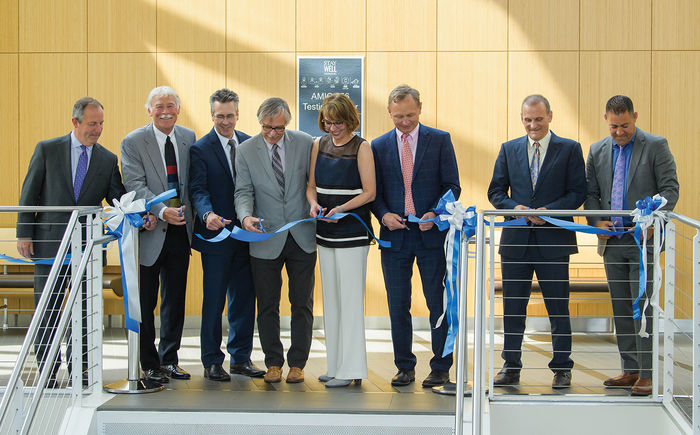Facility will advance regional women’s health initiative
This summer, Penn State Behrend unveiled a state-of-the-art biomedical translational research lab that will support medical clinical trials in the Erie region and expand research opportunities for students in the college’s new biochemistry and molecular biology minor.
The lab also advances Magee-Womens Research Institute (MWRI) of Erie, a $26 million women’s health initiative. Behrend is the academic research and commercialization partner for the initiative, which has already begun six local clinical research trials. The partnership of MWRI and Behrend to form MWRI Erie aims to improve the health of generations of local women and launch a new sector of the Erie region’s economy.
The new 2,200-square-foot lab, located in Behrend’s Advanced Manufacturing and Innovation Center, includes a cell-culture lab, an advanced microscopy lab, and flex space where faculty and student researchers will collaborate.
“While we don’t yet know exactly where the research in this new lab will lead,” Chancellor Ralph Ford said, “we know that our students and faculty, working alongside the MWRI team, will foster discoveries that can lead to viable products, services, and commercial start-ups.”
A second MWRI-affiliated space—an advanced molecular biology teaching lab in the Otto Behrend Science Building—opened in late 2020. This past spring, new faculty members Dr. Jeremiah Keyes and Dr. Ashley Russell, both assistant professors in biochemistry and molecular biology, team-taught an inaugural course in proteins, nucleic acids, and molecular cloning in the new lab.
Keyes previously worked as a postdoctoral research fellow at the University of California at San Diego. He studies the complex signaling networks that control a cell’s response to stimuli. His research has focused on extracellular signal-related kinase, or ERK, a signaling pathway that is hyperactivated in 90 percent of all human cancers.
Russell, an Erie native and 2012 graduate of Penn State Behrend, previously worked as a postdoctoral research fellow at the Johns Hopkins School of Medicine. She studies extracellular vesicles, which allow cells to communicate with one another, and she also researches the effects of chronic stress during pregnancy.
“Dr. Russell and Dr. Keyes will help set the direction for MWRI Erie,” said Dr. Ivor Knight, associate dean for research and graduate studies at Behrend. “Their research could, over time, become the framework for broader medical studies, including clinical trials.
“At the same time, the new teaching and research facilities made possible by the initiative will provide an opportunity for our students to be part of the collaborative research process,” he said. “That’s a game-changer, in terms of career preparation. But the real impact will be felt outside the lab: The work we do in here will directly contribute to new treatments and medical interventions that will improve the health of women in and beyond Erie.”
